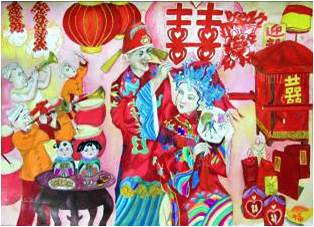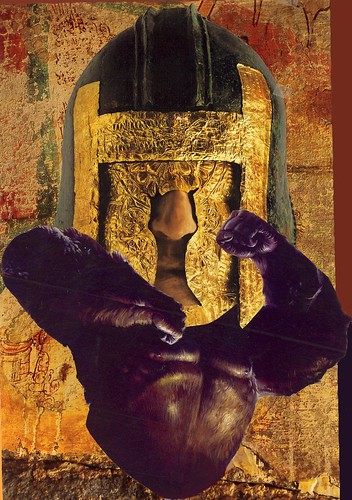Via Flickr:
Messrs Rufus and Burne: We don't care what you do in that tower. And if you want to pose for portraits in front of it wearing turnip-colored armor, that's your business. But we thought we had an understanding. And that understanding was this-- if we are going to allow a couple of non-Hommlet-born "adventurers" to build a tower in our village AND to sit on our council of elders, AND to maintain an armed force of former brigands (if you want to refer to them as "badgers", again, that's your business), then we expect that we will not have frenzied frog cultists in our pantries. Pantries. Our kitchens. What we're saying, Messrs. Rufus and Burne, is that it's all very well and good to have crenallations and catapults, but when invaders bypass your little fortress to assault goodwives in the heart of our village, then it should fall on you and your well-trained soldiers-- and not on the casual militia and wandering preachers to hold the line and repel the attack. Are we together? Please Messrs., do you understand our concern and frustration? What plan can we conceive to make sure that this doesn't happen again?
Friday, April 27, 2012
Hommelet
Thursday, April 26, 2012
Play Report: Menkan to Kāi'ěrwén
Tuesday, April 24, 2012
Friday, April 20, 2012
Play Report: Khanbaliq to Menkan
Friday, April 13, 2012
Khanbaliq Play Report: Final week in Khanbaliq
-- Phi Phong pushed things to far with her father-in-law Ansa. Not only was he not going to just "give" his adopted a son a title he had not earned, but we was thinking about throwing him and his nephew Tetsukichi out of the house so they could go out and make something of themselves.
-- Afu still believed that Gwinch had a large part in the slaving operations and was in the southwest border region raiding villages.
-- Imperial guards showed up one morning to question Anca. Beatriss the dutiful quasi-niece went along and was also questioned about her history in Khanbaliq. When asked about her fiance, Beatriss answered that she didn't know him well and that because he didn't seem serious in his intentions, she considered the engagement ended.
-- During another night out in Fun Town, Phi Phong sucessfully "re-directed" the unwanted amourous advances of a street thug onto a stray ("don't you think she's more your type?"). Somehow, this made Beatriss feel better about Phi Phong.
-- Members of the Zipangese diplomatic community-- just clerks it seemed-- were being arrested.
-- The new abbot of the Monastery of the Two-Fold Path made a surprise visit, seeling help with their ant problem.
-- Tetsukichi was summoned to the Imperial City . . .
. . . in the course of interrogation, Tetsukichi mentioned that he was thinking about leaving Khanbaliq to visit relatives in the Southwest border region. "Oh, really? We may have a job for you . . . "
The Emperor, it seemed, was also concerned about Gwinch. Slavery wasn't mentioned. Instead the Emperor's concern was that like first Governor Kawabi and then General Goyat, Gwinch too, had been turned from his commission since arriving in the Southwest border region. And now it was Tetsukichi's turn to go down there and find out what was going on and to punish any and all traitors.
Anca was also ready to leave Khanbaliq and the next several days were preparing a caravan that include Anca, his family, his warriors and their families and their many herds, plus a small group of monks from the Emperor's court, and finally the PCs and their family members, henchmen, and servants. Buyuk sent Beatriss a letter, apologize, and asking her to reconsider leaving. She tried to see him in the Imperial City, but finding that he was unavailable, left a terse message of farewell. And so the caravan left Khanbaliq, in a cloud of dust.
Monday, April 9, 2012
Khanbaliq Play Report: Beatriss and Tetsukichi's Guide to Fun Town AND Family Life
Although Beatriss’s nemesis Madam Guto has finally been “dealt with,” Beatriss and Tetsukichi noticed with some alarm that one of her former charges, a charming young woman named Phi Phong was actually really really charming. Golfo had married her. Fair enough, he is a man who appreciates an attractive and vivacious woman and doesn’t care about the misfortunes of her past. But Tetsukichi’s Uncle Anca Sansar had adopted the big-hearted but loutish and low-born Golfo as his son and seemed to delight in giving both Golfo himself and especially his daughter-in-law a place of prominence in his household.
Tetsukichi sought an audience with Afu in the Forbidden City, but was diverted from his goal of seeking the Priest’s assistance in divining Phi Phong’s powers and intentions. Because Afu had something else on his mind. Two things. First, he believed that Gwinch, the foreign sohei was directing slaving operations from the Southwest frontier region. AND he believed that “Fun Town”—the entertainment district where out-of-town laborers spent most of their wages— was also the secret base of the Slavelords.
Beatriss and Testsukichi agreed to investigate Fun Town. Following a tip from a drunk, they ended up at the tavern of the White Warrior and enjoyed a quick, greasy meal. Beatriss struck up a conversation with a monk and asked him about Phi Phong and whether he might help determine the source of her powers. Of course he could help—or at least he knew someone else at the monastery who could and he was on his way there now. And which monastery was that? The Monastery of the Two-fold Path, right outside the city. Ok, maybe another time. Leaving the tavern, they saw the ghostly form of a woman jumping from the third-story window of the building next-door. Shrugging off this oddity, they returned home.
Beatriss and Tetsukichi enjoyed quotidian life for a few days. There was a naming ceremony for Tetsukichi's daughter, who was had been born during the winter. Afu presided over the ceremony. Afterwards, he talked with Phi Phong and reported to Beatriss that she seemed like a very nice young woman. (Arrghh! Beatriss resolved that she would NOT leave her kids with Phi Phong.)
Saturday, April 7, 2012
Play report: The really bad thing about cobras spitting poison in yourface . . .
Our party (two fighters, an elf, and a cleric) took refuge for the night in what seemed to be a nice enough place—no beasties, secure doors, and enough room to stretch our limbs a little. But doors secure against other people are not secure against spitting cobras. We had a watch, but we were badly prepared for the surprise intrusion. The potion we’d purchased in town saved the life of Lobo the fighter, but Aberdeen was blinded. (The cobras got all deaded.)
Also, although "special pants" are a good defense against cobra spit, rubbing the pants on your already-damaged eyes is inefficacious.
With a mixture of defiance and fatalism, we got up, put on our armor, and delved deeper. Aberdeen accepted his new role as torch bearer and walked with one hand on someone’s shoulder.
Wednesday, April 4, 2012
SNAKES! And chutes, and ladders. Also rats.
A long-time player took a turn at running a game last week and she's doing a great job running a dungeon based on the "chutes/snakes & ladders" boardgame. This may be her entry to the one-page dungeon contest so I won't give too much away, but will instead talk about my character . . .
On second thought, I'll make this brief: his name is Aberdeen, he's fighter, and his movement rate is 3.
This is the first time I've applied encumberance with any exactness. The Labyrinth Lord rules make it inexcusably easy to calculate and the GM said we should know how much we weigh. Chainmail, shield, weapons, food & water plus standard dungeon equipment like rope and torches. And I'm encumbered!







